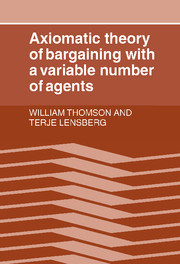Book contents
- Frontmatter
- Contents
- Acknowledgments
- List of symbols and notation
- List of axioms
- 1 Preliminaries
- 2 Axiomatic theory of bargaining with a fixed number of agents
- 3 Population Monotonicity and the Kalai–Smorodinsky solution
- 4 Population Monotonicity and the Egalitarian solution
- 5 Truncated Egalitarian and Monotone Path solutions
- 6 Guarantees and opportunities
- 7 Stability and the Nash solution
- 8 Stability without Pareto-Optimality
- 9 Stability and the Leximin solution
- 10 Population Monotonicity, Weak Stability, and the Egalitarian solution
- 11 Stability and Collectively Rational solutions
- 12 Invariance under Replication and Juxtaposition
- Bibliography
- Index
1 - Preliminaries
Published online by Cambridge University Press: 23 March 2010
- Frontmatter
- Contents
- Acknowledgments
- List of symbols and notation
- List of axioms
- 1 Preliminaries
- 2 Axiomatic theory of bargaining with a fixed number of agents
- 3 Population Monotonicity and the Kalai–Smorodinsky solution
- 4 Population Monotonicity and the Egalitarian solution
- 5 Truncated Egalitarian and Monotone Path solutions
- 6 Guarantees and opportunities
- 7 Stability and the Nash solution
- 8 Stability without Pareto-Optimality
- 9 Stability and the Leximin solution
- 10 Population Monotonicity, Weak Stability, and the Egalitarian solution
- 11 Stability and Collectively Rational solutions
- 12 Invariance under Replication and Juxtaposition
- Bibliography
- Index
Summary
Introduction
We imagine a group of individuals to whom is available a certain set of choices over which their preferences differ. These choices may concern general features of society such as laws and institutions or concrete details of their daily lives such as who should perform a certain task on a given day or how much of a particular good each individual should receive. The problem they face is to make a choice that would provide an equitable compromise. The aim of the present study is to contribute to the understanding of how such a choice could, or should, be made.
The first step of any such study consists in precisely specifying the class of choice problems that the group may encounter; the analysis is confined to that class. The search is then for desirable solutions, a solution being a method of associating with each problem in the class an outcome feasible for that problem and interpreted as the “best” alternative.
Several important classes of problems have been extensively studied in the literature. In the Arrow (1951) tradition, an abstract set of feasible alternatives, on which the agents' preferences are defined, is given. In the most general formulation, these preferences are assumed to have only ordinal significance, and no structural assumptions are made on the feasible set.
At another extreme is the important class of economic problems of fair division.
Information
- Type
- Chapter
- Information
- Publisher: Cambridge University PressPrint publication year: 1989
